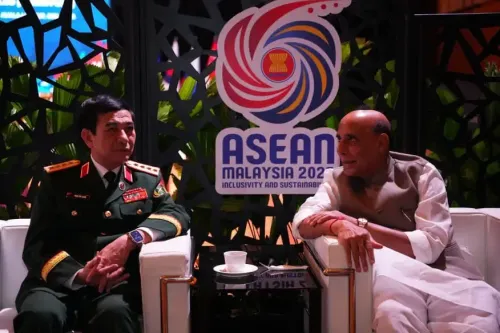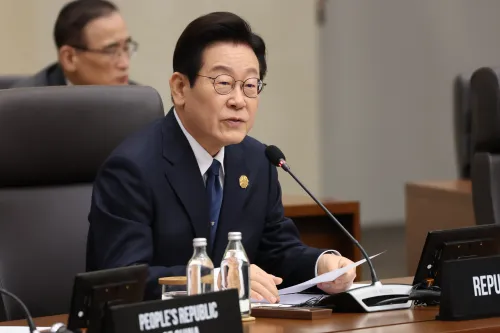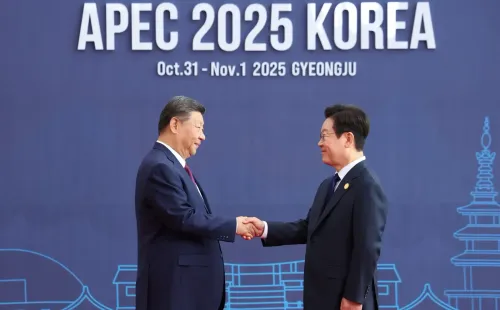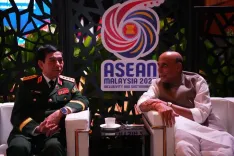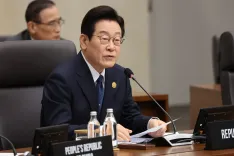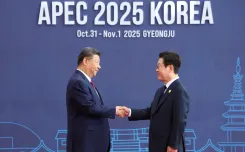The Interim Government of Bangladesh: A Betrayal of Liberation Ideals

Synopsis
Key Takeaways
- Mujibur Rahman's residence symbolizes Bangladesh's liberation.
- The interim government faces criticism for inaction against vandalism.
- Political instability is exploited by extremist factions.
- International concern over Bangladesh's governance grows.
- Vandalism reflects a larger narrative of erasure of history.
New Delhi: The vandalism at the historic residence of Mujibur Rahman on February 5-6 has sent shockwaves throughout Bangladesh and beyond, sparking a wave of outrage and concern. As the nation grapples with a period of political instability under an interim government, these bold attacks on a site synonymous with Bangladesh's Liberation War provoke critical questions regarding governance, law enforcement, and the commitment to protecting national heritage. The pressing question is clear: How can a government that claims to uphold democratic ideals and respect the legacy of independence allow such blatant violations against the very symbols of its foundation?
Sheikh Mujibur Rahman, celebrated as the founding father of Bangladesh, played a crucial role in the nation’s struggle for independence from Pakistan. His residence at 32 Dhanmondi in Dhaka is not just a structure; it embodies a site of profound historical and emotional significance. It was within these walls that Mujib made key decisions leading to the tumultuous 1971 Liberation War. Tragically, it was also here that he and most of his family met their untimely end on August 15, 1975, marking one of the most tragic chapters in Bangladesh's history.
Now a memorial museum, the house has attracted visitors worldwide, eager to understand the sacrifices that led to Bangladesh's independence. Given its immense importance, any act of vandalism against this site is not merely a crime; it is an affront to the nation’s collective memory. Mujib’s heartfelt words resonate now more than ever: "Write my name in place of the father's name of the girls raped during the Liberation War, and give the address '32-Dhanmondi'." These sentiments encapsulate his unwavering dedication to the people, a legacy that is currently under threat.
The interim government of Bangladesh, led by Nobel laureate Muhammad Yunus, came to power with the promise of fostering a neutral environment for upcoming elections. However, it has become increasingly apparent that this administration is either incapable or unwilling to address the recent surge of vandalism sweeping the nation. While political instability is not new to Bangladesh, the recent violent incidents suggest a deeper issue: a government that may be either complicit in or grossly negligent of these actions.
One particularly disturbing development is the rise of bulldozer rallies, which have been transformed into tools of destruction. These events, initially framed as political protests, have been systematically aimed at Dhanmondi. The organized and deliberate nature of these attacks raises disturbing questions about potential state complicity or, at the very least, a troubling inaction. Alarmingly, eyewitness accounts and video evidence from the demolition site reveal the presence of an ISIS flag during the chaos, underscoring the involvement of extremist factions in these acts of violence. This situation points to a dangerous link between the interim government and radical Islamic groups, notably Hizb ut-Tahrir, which appears to have gained traction under this administration.
Despite the outcry from civil society and international observers, the interim government’s response has been lackluster at best. There have been no rapid arrests, and official communications have been vague, if not completely dismissive. This raises critical questions about the rule of law and the government's commitment to its citizens. If the state fails to protect the very symbols of its liberation struggle, what trust can the public have in its ability to safeguard its people?
In scrutinizing the attacks on Mujibur’s House, it is essential to investigate the involvement of prominent political figures, extremist groups, social media influencers, and foreign intelligence agencies. The Inter-Services Intelligence (ISI) of Pakistan has frequently been implicated in interfering with Bangladesh's political dynamics, and its potential role in inciting radical factions cannot be overlooked. It is noteworthy that the ISI’s Chief recently visited Bangladesh, marking the first visit of any ISI chief since 1971. Evidence indicates that ISI agents have provided both ideological and logistical support to organizations like Hizb ut-Tahrir, which is actively working to undermine Bangladesh’s secular governance.
Moreover, figures such as YouTuber Pinaki Bhattacharya have significantly influenced the narrative surrounding these targeted attacks. Bhattacharya, known for his provocative political commentary, has been accused of promoting divisive rhetoric that empowers extremist groups. On the eve of this vandalism, Pinaki was also seen to have directly incited a mob, through his Facebook account, to demolish the 32 Dhanmondi using a bulldozer. His influence, alongside that of other political influencers, has cultivated an environment where acts of vandalism are not only tolerated but, in some circles, even encouraged.
The Bangladesh Nationalist Party (BNP) also plays a crucial role in this scenario. With a long-standing history of trying to diminish the legacy of Sheikh Mujibur Rahman, the party often aligns itself with factions aiming to undermine his prominence in Bangladesh’s political and historical narrative. During the February 5 vandalism and subsequent demolition of Bangabandhu's residence, reports indicated that Ayesha Akhter Dina, a leader of the BNP Women cell of Narayanganj city, provided the bulldozers employed in the demolition. Although BNP leaders have publicly distanced themselves from any direct involvement in the attacks, their reluctance to denounce these actions hints at either tacit approval or a calculated political strategy.
Radical Islamic factions have increasingly influenced the recent wave of destruction in Bangladesh, with the display of an ISIS flag during the demolitions serving as a stark reminder of their growing presence amid the nation’s political chaos. These groups, notorious for their efforts to eradicate historical narratives that conflict with their extremist ideologies, seem to have found unexpected support within the interim government. Hizb ut-Tahrir, in particular, has drawn attention for its long-standing agenda to undermine Bangladesh’s secular framework in favor of a more radical one. The government’s failure to rein in their activities raises alarming questions about its potential complicity with these extremist elements.
The assault on historical sites has not been confined to Mujibur's House; other significant monuments related to the nation’s political heritage, especially those linked to key figures from the Liberation War, have also been targets of this campaign of erasure. These deliberate actions indicate a concerted effort to obliterate vital symbols of Bangladesh’s political and historical identity. The destruction of these landmarks goes beyond mere political vengeance; it represents a systematic attempt to dismantle the very foundations of the country’s narrative of independence.
Amidst this turmoil, the inaction of Bangladesh’s military stands out as a glaring failure. Tasked with ensuring security and stability, the armed forces remained largely passive while historic sites were systematically destroyed. Given the organized nature of these attacks, the military’s lack of intervention raises serious doubts about its impartiality and operational effectiveness. Whether this inaction stems from a deliberate choice or from higher political directives, it paints a disconcerting picture of the current state of governance and institutional integrity in Bangladesh.
The Indian government has issued a strong condemnation of the recent vandalism at the residence of Mujibur Rahman, describing it as an affront to the intertwined histories of India and Bangladesh. Officials in New Delhi highlighted the importance of protecting the legacy of Bangladesh’s fight for independence, urging the Dhaka administration to take decisive action against the offenders. As a pivotal ally during the 1971 Liberation War, India has expressed alarm over the rising influence of extremist factions and the possible interference of external players, such as the ISI, in undermining Bangladesh's secular principles.
In this context, a significant amount of Anti-India rhetoric has emerged in Bangladesh, with advisors to the interim government, such as Nahid Islam and Touhid Hossain, accusing India of aiding Sheikh Hasina in destabilizing Bangladesh from its own soil. Foreign Affairs Advisor Touhid Hossain even summoned the acting High Commissioner of India to Dhaka and presented him with a letter of protest regarding this issue.
This act of vandalism goes beyond mere property damage, revealing a deeper malaise within Bangladesh’s political landscape and governance. An interim government that fails to protect the nation’s historical sites demonstrates an inability to facilitate free and fair elections or uphold the principles of democracy. For Bangladesh to genuinely honor its heritage and secure a prosperous future, it must confront and eliminate those who aim to obliterate or manipulate its historical narrative.
(Deepak Kumar is an Indian security and strategic affairs analyst specializing in geopolitics and geo-economics. Views expressed are personal)

